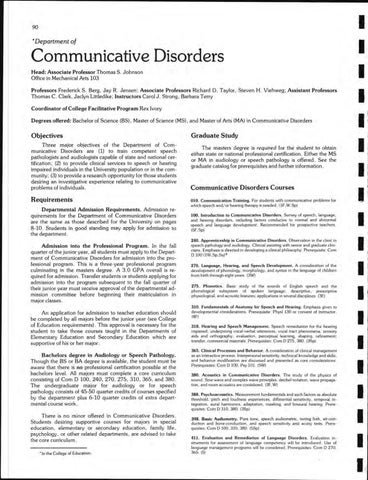90
• Department of
Commu·nicative Disorders Head: Associate Professor Thomas S. Johnson Office in Mechanical Arts 103 Professors Frederick S. Berg, Jay R. Jensen; Associate Professors Richard D. Taylor, Steven H. Viehweg; Assistant Professors Thomas C. Clark , Jaclyn Littledike; Instructors Carol J. Strong , Barbara Terry
I I I I
Coordinator of College Facilitative Program Rex Ivory Degrees offered: Bachelor of Science (BS), Master of Science (MS) , and Master of Arts (MA) in Communicative Disorders
Objectives Three major objectives of the Department of Communicative Disorders are (1) to train competent speech pathologists and audiologists capable of state and national certification; (2) to provide clinical services to speech or hearing impaired individuals in the University population or in the community; (3) to provide a research opportunity for those students desiring an investigative experience relating to communicative problems of individuals.
Requirements Departmental Admission Requirements. Admission requirements for the Department of Communicative Disorders are the same as those described for the University on pages 8 -10. Students in good standing may apply for admission to the department. Admission into the Professional Program. In the fall quarter of the junior year, all students must apply to the Department of Communicative Disorders for admission into the professional program. This is a three-year professional program culminating in the masters degree. A 3.0 GPA overall is required for admission . Transfer students or students applying for admission into the program subsequent to the fall quarter of their junior year must receive approval of the departmental admission committee before beginning their matriculation in major classes . An application for admission to teacher education should be completed by all majors before the junior year (see College of Education requirements). This approval is necessary for the student to take those courses taught in the Departments of Elementary Education and Secondary Education which are supportive of his or her major. Bachelors degree in Audiology or Speech Pathology. Though the BS or BA degree is available, the student must be aware that there is no professional certification possible at the bachelors level. All majors must complete a core curriculum consisting of Com D 100, 240 , 270 , 275, 310, 365, and 380. The undergraduate major for audiology or for speech pathology consists of 45-50 quarter credits of courses specified by the department plus 6-10 quarter credits of extra departmental course work. There is no minor offered in Communicative Disorders . Students desiring supportive courses for majors in special education , elementary or secondary education, family life , psychology, or other related departments, are advised to take the core curriculum. 'In the College of Education.
I
Graduate Study The masters degree is required for the student to obtain either state or national professional certification. Either the MS or MA in audiology or speech pathology is offered. See the graduate catalog for prerequisites and further information.
Communicative Disorders Courses 010. Communication Training. For students with communicative problems for which speech andl or hearing therapy is needed . (IF,W,Sp) 100. Introduction to Communicative Disorders. Survey of speech, language , and hearing disorders, including factors conducive to normal and abnormal speech and language development. Recommended for prospective teachers. (5F,Sp) 240. Apprenticeship in Communicative Disorders. Observation in the clinic in speech pathology and audiology . Clinical assisting with senior and graduate clinicians. Emphasis is directed in developing a clinica l philosophy . Prerequisite: Com D 100 (lW ,Sp,Su)@ 270_ Language. Hearing. and Speech Development. A consideration of the development of phonology. morphology. and syntax in the language of children from birth through eight years. (3W) 275. Phonetics. Basic study of the sounds of English speech and the phonological subsystem of spoken language: descriptive. prescriptive physiological , and acoustic feature s: applications in several disciplines. (3F) 310. Fundamentals of Anatomy for Speech and Hearing. Emphasis given to developmental considerations. Prerequisite : Physl 130 or consent of instructor. (4F)
318. Hearing and Speech Management . Speech remediation for the hearing impaired : underpining vocal·verbal utterances, vocal tract phenomena: sensory aids and orthography: evaluation. perceptual learning , shaping, refinement: transfer , commercial materials. Prerequisites: Com D 275. 380. (3Sp) 365. Clinical Processes and Behavior. A consideration of clinical management as an interactive process . Interpersonal sensitivity. technical knowledge and skills. and behavior modification are discussed and presented as core considerations . Prerequisites: Com D 100, Psy 101. (5W) 380. Acoustics in Communicative Disorders. The study of the physics of sound. Sine wave and complex wave principles. decibel notation, wave propaga tion , and room acoustics are considered. (3F ,W) 388. Psychoacoustics. Measurement fundamentals and such factors as absolute threshold. ' pitch and loudness experiences . differential sensitivity. temporal in· tegration. aural harmonics, adaptation. masking. and binaural hearing . Prere· qUisites: Com D 310. 380. (3Sp)
I
I I I I I I I I I
398. Basic Audiometry. Pure tone , speech audiometric , tuning fork, air-conduction and bone·conduction , and speech sensitivity and acuity tests. Prerequisites: Com D 100. 310. 380. (5Sp) 411. Evaluation and Remediation of Language Disorders. Evaluation in· struments for assessment of language competency will be introduced . Use of language management programs will be considered. Prerequisites: Com D 270. 365. (5)
I I
